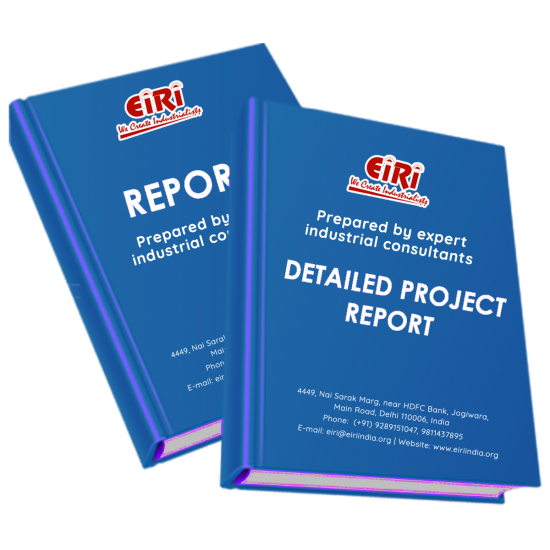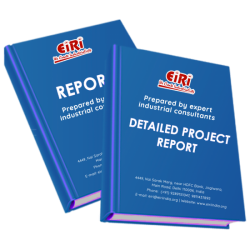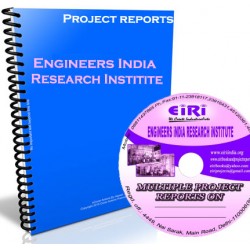Detailed Project Report on HDPE Mono Filament Nets

- More than 45 years of experience
- Managed by expert industrial consultants
- ISO 9001-2015 Certified
- Registered under MSME, UAM No: DL01E0012000
- 24/5 Research Support
Get your quesries resolved from an industry expert. Ask your queries before report or book purchase. - Custom Research Service
Speak to the our consultant to design an exclusive study to serve your research needs. - Quality Assurance
All reports are prepared by highly qualified consultants & verified by a panel of experts. - Information Security
Your personal & confidential information is safe & secure.
HDPE MONO FILAMENT NETS
[EIRI/EDPR/1398] J.C. 175
INTRODUCTION
A tangle of monofilament fishing line. The most common colorless variety can be seen. Monofilament fishing line (shortened to just monofilament) is fishing line made from a single fiber of plastic. Most fishing lines are now monofilament because monofilament fibers are cheap to produce and are produced in a range of diameters which have different tensile strengths (called "tests" after the process of tensile testing). Monofilament line is also manufactured in different colors, such as clear, white, green, blue, red, and fluorescent.
Monofilament is made by melting and mixing polymers and then extruding the mixture through tiny holes, forming strands of line, which is then spun into spools of various thicknesses. The extrusion process controls not only the thickness of the line but its test as well.
History
DuPont made public in 1938 that their company had invented nylon. This new invention was the first synthetic fiber, fabrics that are commonly used in textiles today. In 1939, DuPont began marketing nylon monofilament fishing lines; however, braided Dacron lines remained the most used and popular fishing line for the next two decades, as early monofilament line was very stiff or "wiry", and difficult to handle and cast. Early monofilament did, however, have good knot strength and very low visibility to the fish, creating a small loyal following among fishermen. In 1959 DuPont introduced Stren, a thinner and much softer monofilament line that could be used in a large range of reels, including newly introduced spinning and spin casting tackle. Stren's monofilament lines soon became a favorite with many fishermen because of its overall ease of use and it spawned a whole host of imitators.
New materials, e.g., Spectra or Dyneema, are finding growing usage as fishing lines. Polyvinylidene fluoride sold as fluorocarbon is very much like nylon monofilament, but has several advantages. Optical density is lower, which makes the line less easily discernable. The surface is harder so it is more resistant to sharp fish teeth and wear. Furthermore PVDF does not take up water and it is resistant to UV-light. It is denser than nylon, too, which makes it sink faster and it will not float on the water surface.
Dyneema is also becoming very popular and it is much stronger, but it is used mostly as a braided fishing line. Because the elastic stretching is only a fraction of that of nylon monofilament, the contact with fish or bait is more direct. It is often used for deep water fishing from boats because lower diameters are used, which give less resistance to currents, and the low stretch makes bites easily detectable.
COST ESTIMATION
Plant Capacity 77,760 sq.mt/Day
Land & Building (1500 sq.mt.) Rs. 1.53 Cr
Plant & Machinery Rs. 3.35 Cr
Working Capital for 2 Months Rs. 5.01 Cr
Total Capital Investment Rs. 10.11 Cr
Rate of Return 28%
Break Even Point 48%
CONTENTS
INTRODUCTION
WEAVING MACHINES (LOOMS)
INDIAN STANDARD
FLOW SHEET DIAGRAM OF THE PROCESS
MANUFACTURERS/SUPPLIERS OF HDPE MONOFILAMENT NET
RELATED INFORMATIONS
MANUFACTURERS/SUPPLIERS OF PLANT & MACHINERY
MANUFACTURERS/SUPPLIERS OF RAW MATERIALS
APPENDIX – A:
01. PLANT ECONOMICS
02. LAND & BUILDING
03. PLANT AND MACHINERY
04. OTHER FIXED ASSESTS
05. FIXED CAPITAL
06. RAW MATERIAL
07. SALARY AND WAGES
08. UTILITIES AND OVERHEADS
09. TOTAL WORKING CAPITAL
10. TOTAL CAPITAL INVESTMENT
11. COST OF PRODUCTION
12. TURN OVER/ANNUM
13. BREAK EVEN POINT
14. RESOURCES FOR FINANCE
15. INSTALMENT PAYABLE IN 5 YEARS
16. DEPRECIATION CHART FOR 5 YEARS
17. PROFIT ANALYSIS FOR 5 YEARS
18. PROJECTED BALANCE SHEET FOR (5 YEARS)
How to Make Project Report?
Detailed Project Report (DPR) includes Present Market Position and Expected Future Demand, Technology, Manufacturing Process, Investment Opportunity, Plant Economics and Project Financials. comprehensive analysis from industry covering detailed reporting and evaluates the position of the industry by providing insights to the SWOT analysis of the industry.
Each report include Plant Capacity, requirement of Land & Building, Plant & Machinery, Flow Sheet Diagram, Raw Materials detail with suppliers list, Total Capital Investment along with detailed calculation on Rate of Return, Break-Even Analysis and Profitability Analysis. The report also provides a birds eye view of the global industry with details on projected market size and then progresses to evaluate the industry in detail.
We can prepare detailed project report on any industry as per your requirement.
We can also modify the project capacity and project cost as per your requirement. If you are planning to start a business, contact us today.
Detailed Project Report (DPR) gives you access to decisive data such as:
- Market growth drivers
- Factors limiting market growth
- Current market trends
- Market structure
- Key highlights
Overview of key market forces propelling and restraining market growth:
- Up-to-date analyses of market trends and technological improvements
- Pin-point analyses of market competition dynamics to offer you a competitive edge major competitors
- An array of graphics, BEP analysis of major industry segments
- Detailed analyses of industry trends
- A well-defined technological growth with an impact-analysis
- A clear understanding of the competitive landscape and key product segments
Need Customized Project Report?
- Ask for FREE project related details with our consultant/industry expert.
- Share your specific research requirements for customized project report.
- Request for due diligence and consumer centric studies.
- Still haven't found what you're looking for? Speak to our Custom Research Team
About Engineers India Research Institute:
Note: We can also prepare project report on any subject based on your requirement and country. If you need, we can modify the project capacity and project cost based on your requirement.
Our Clients

Our Approach
- Our research reports comprehensively cover Indian markets (can be modified as per your country), present investigation, standpoint and gauge for a time of five years*.
- The market conjectures are produced on the premise of optional research and are cross-accepted through associations with the business players
- We use dependable wellsprings of data and databases. What's more, data from such sources is handled by us and incorporated into the report
Why buy EIRI reports?
- Our project reports include detailed analysis that help to get industry Present Market Position and Expected Future Demand.
- Offer real analysis driving variables for the business and most recent business sector patterns in the business
- This report comprehends the present status of the business by clarifying a complete SWOT examination and investigation of the interest supply circumstance
- Report gives investigation and top to bottom money related correlation of real players/competitors
- The report gives gauges of key parameters which foresees the business execution
























